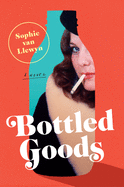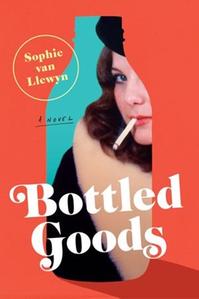
 Bottled Goods, Sophie van Llewyn's first novel, is a curious story of oppression set in 1970s Communist Romania, featuring a young woman pressing against the confines not only of culture and state but of family. Largely realistic, the narrative takes the odd, surprising turn toward magical realism, making the already strange world of heavily monitored government control feel stranger still.
Bottled Goods, Sophie van Llewyn's first novel, is a curious story of oppression set in 1970s Communist Romania, featuring a young woman pressing against the confines not only of culture and state but of family. Largely realistic, the narrative takes the odd, surprising turn toward magical realism, making the already strange world of heavily monitored government control feel stranger still.
Readers first meet Alina as a girl, then a young single woman, working as a translator and tour guide on the Romanian coast. It is here that she meets her future husband, a history student (later professor) named Liviu. While Alina comes from a background of privilege and property, lost when the Communists took power, Liviu comes from privation, which he does not let her forget. When they marry, "It was not a wedding, but a documentary about customs and traditions that she had been watching, trapped inside the bride's body." Trapped indeed in several ways, she goes to work as an elementary schoolteacher--which she dislikes--but life is tolerable until Liviu's brother defects to France. Then the Secret Services enter their lives and everything changes.
Luckily or unluckily, Alina has an aunt with connections to the government, to whom she turns for help. Aunt Theresa's assistance varies from intervention with the authorities to entanglements with fairies and strigoi (Romanian folk spirits). When Alina gets desperate, the fairies' form of help will upturn her life yet again.
The short chapters in Bottled Goods resemble pieces of flash fiction (van Llewyn's accustomed form). Some unfold in first-person narration, some in third person; some take the form of lists, postcards or how-tos. This formal variation puts readers slightly off-balance, as Alina is continually off-balance, trying to navigate the dizzying rules of her society and increasingly frustrating relationships with her husband and her mother, among others. Van Llewyn's prose, often simple and unadorned, has moments of lovely imagery: "The beach is a conglomerate of eyes glazing her as if she were an apple."
Though not always entirely likable, Alina is an insistent protagonist, pulling readers along relentlessly. The magical elements of her story play well off the mundane and the grotesque in everyday life, with surprisingly charming details throughout. Fluid in form, often stark in style and surrealistic in subject matter, Bottled Goods is a strange and compelling story about freedom of choice and those we choose to keep near to us. --Julia Kastner, librarian and blogger at pagesofjulia
Shelf Talker: An unusual story of 1970s Communist Romania with a thread of magical realism, told in flash-style snippets.

